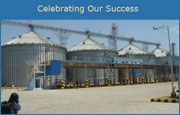 July 9, 2012 -- Punjab Silos, an IFC project that helps ensure India’s food security, recently received high commendation under the “Best Pathfinder Project” category at the Partnership Awards in London.
July 9, 2012 -- Punjab Silos, an IFC project that helps ensure India’s food security, recently received high commendation under the “Best Pathfinder Project” category at the Partnership Awards in London.
The IFC project was cited as pivotal in “delivering a sea change in policy thinking throughout India on how to more efficiently feed the country’s population” and for its replicability.
In 2009, the Indian state of Punjab asked IFC to advise on the public-private partnership (PPP) to develop state-of-the-art, long-term storage silos to help address the state’s shortage of storage space for 7.1 million tons of wheat targeted for below poverty line families. Poor storage resulted in losses of grain stock and in reduced nutritional value.
The project was implemented in April 2011 and operational by March 2012. The PPP supported a 50,000 metric ton storage facility that was built, owned, and operated by LT Foods Limited, and uses state-of-the-art technology and inventory management methods. The transaction mobilized $7 million in private investment. Savings are estimated to reach $6 million during the concession period.
The new silos now ensure that, on a yearly basis, 500,000 of India’s poorest will receive better nutrition through these improved storage facilities.
Overcoming Challenges
Setting up the PPP did not come without its challenges. The project team, which included Vipul Bhagat, then-PPP business line manager in South Asia, Senior Investment Officer Neeraj Gupta and Investment Officer Jay Lurie, point out that introducing a new model for food storage to multiple stakeholders at the state and national level in India made this project and its accompanying policy challenging to push through.
“As India's last attempt at a grain storage PPP was completed eight years earlier, this pilot could either have failed, relegating grain storage PPPs again to the back burner of food storage policy, or it could have been deemed a success with positive ramifications both for linkages in the supply chain and replicability throughout India and in other markets,” Gupta and Lurie noted. “Fortunately, the project has been deemed a success by state and national policy makers.”
Based on the pilot’s success, the government of Punjab now envisions expanding the program to up to 2.5 million metric tons of capacity.
IFC is also assisting the government of India to develop a model concession document for rolling out the pilot in 10 states. IFC is assisting the governments of Sindh and Punjab in Pakistan on similar projects, and is examining opportunities in Africa.